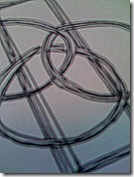This post is about restoration -- restoration of community and peace after a period of brokenness.
In the story Alice In Wonderland, the Cheshire Cat at one point tells Alice, "If you don't know where you're going, any road will take you there." It's an interesting thought, and holds true in many ways. If we want to end up in a particular place, we'd better figure out where that place is located before we strike out on the road to get there. Here's how this thought relates to restoration: What exactly do we hope for in our communities? When bad things happen, what do we propose as appropriate ways to deal with that? The reason the question about the end is important is that our goal affects the means used to get there.
For example. Suppose two people decide to get divorced. They have some children, and they also have some extended family. In addition to children and future grandchildren who will be affected by the divorce, there are grandparents, aunts, uncles, and cousins who will all be affected not only by the divorce itself, but whose relationships will be redefined by the termination of the marriage.
A typical, traditional, response to a decision to divorce is to engage in a legal process which is conceived along the same lines as a battle: the parties "lawyer up" and battle it out for rights over property division, support, custody. This model of divorce comes from the litigation paradigm in which there is a moral battle in which one side is "right" and the other side is "wrong" and in which one party will "win" and the other party will "lose". Each party engages a lawyer whose job is to ensure that the party wins against the adversary in this battle.
Under this view, relatives are also expected to take sides and proclaim loyalty to one (former) spouse or the other. Often, children are also placed in the middle, used either as pawns in a power play or as sources of information. The spectacles on our noses through which we view the battle scene are tinted with hues designed to paint the other party as bad and as someone who must be battled against.
But let's challenge the paradigm a bit. Isn't it a bit inconsistent with this viewpoint that only a few years ago, the person on the other side of the battle was one's partner in a wedding? If this person across the divorce negotiating table is painted as purely evil, how then do we manage to work out parenting responsibilities for many years forward, how do we arrange seating at our children's high school graduation or wedding? What if we even end up sharing the same nursing home with that person, as our children place us in the same home? Is portraying that person as the personification of evil really the best way? When all is said and done, when all the divorce battles have been fought and all the "losing" players are dead on the battlefield, do we really want those dead people on the battlefield to consist of people whom we have loved, who are the parents of our children, or who were until recently our in-laws and cousins? It's not a pleasant scene, and I'm not the only one who has noticed.
Divorce is but one example of how our "battlefield" type paradigms around the concept of "justice" have failed us.
Even more extreme examples of brokenness are those that come from violations of the criminal code. Murder, assault, robbery. If anything, the way we deal with these crimes is even more counterproductive. Suffice it to say that the system is incredibly expensive, the USA has the highest incarceration rate of almost any country in the history of the world, and we still live in fear of crime.
But maybe brokenness in our everyday life is more mundane than this. So, let's add some lesser insults. Like purse snatching, verbal abuse, fist fights. What about aggressive drivers, employees who gossip, students on the playground who bully or who make fun of our clothing? What about a neighbor who mows his lawn at 6 AM on a Saturday morning, just outside our bedroom window?
Is there possibly a new paradigm that would enable us to deal with these issues -- with the whole range of human conflict -- in ways that heal rather than protract, in ways that address root causes and provide solutions rather than applying plaster over an open wound?
What's the common theme?
All of these examples represent areas of our lives where community has been lost. All around the world, communities are suffering from brokenness, lack of relationship or negative relationships, and pain. The pain that comes from separation and from not being in right and peaceful relationships, no matter how that is defined. So, where is "Justice," in relation to these things? Can a new way of doing and achieving "Justice" restore peace?
Justice means different things to different people. Here is where my Alice in Wonderland idea comes into play. I suggest that in order to determine how to respond to each of these situations, we should first calculate where we want to end up. What is justice? Do we want a system of justice that leaves our spouse wounded on a legal battlefield? Do we want a system that primarily just locks people away? Do we want a system where all "right" and "wrong" is measured solely in terms of money damages, rather than doing actions or making apologies that might make amends in other ways? It has always struck me as a bit odd that 18th century England dealt with debtors by putting them in prison. If anything, it would seem that debtors would need to work in order to work off their debt. But that was the paradigm within which that system operated. What is our paradigm today? Should it be reexamined?
The primary paradigm of our present system is punitive, of retribution. This is called Retributive Justice. It's the principle of punishment, and a system of fines and imprisonment. Rehabilitation is not a goal. Of course, locking people away can serve an important purpose, in that it prevents them from doing the act again. For awhile at least, until they are released again. The problems are that incarceration is costly and it doesn't address the root causes that caused the negative behavior in the first place. If a man was a drug addict before he was incarcerated, he's likely to return to being a drug addict after he's released, and that he'll also return to crime. If he was a member of a gang before incarceration, nothing magic is going to make him no longer a gang member when he gets out. Locking someone up and throwing away the key is possible, and it has immediate beneficial consequences, but only at tremendous cost to society.
There are other rationale supporting imprisonment of offenders. I'm not really wanting to debate or enumerate all those rationale. My goal is to point out that if our goal is x, we should be thinking in terms of how to reach that goal and whether what we are doing is effective or not. Is it really our goal to lock up every offender and take away the key, or is our goal actually the hope of a safer society?
Think about it. Is our goal as a society to make sure a prisoner never sees the sun again, or is it actually our goal to have a safer society? In other words, what do we hope to achieve by locking him up? Is it our goal as a society simply to make him feel pain and remorse, or do we actually desire for him to acquire some deeper moral understanding of what he did to the victim?
If safety and peace could be achieved some other way, would we choose to do that? If we could create a moral sense in a defendant through some other means in which the victim would actually receive the satisfaction of a sincere apology, would we?
In other words, is our present system set up so that it actually achieves our goals, or should we be open to new ideas? Is our present system about as effective at achieving present day goals as the old debtors prisons were at eliminating the problem of debt? Is it time to rethink? I would argue, vehemently, "yes"!
No system of justice does everything that we would hope. But some are more effective than others. I'm going to compress an entire doctoral dissertation into one line as follows: "What we are doing doesn't work very well." We need to rethink. And, we need to rethink in more than glib sound bites, we need to engage in serious discussion about policy. Lawsuits and court actions of every kind leave road kill. Former business associates no longer speak to one another, divorced spouses can't agree on which day to swap kids at Christmas. An 18 year old gets locked away for 20 years, due to be released certainly as a hardened criminal with no education and no resources. So, what are some alternatives?
One alternative is called Restorative Justice, and it's a model that is being rapidly adopted around the world, including in schools, communities, juvenile prisons, adult prisons. (This is actually my third blog post about Restorative Justice. Post #1 "What Is Restorative Justice" is HERE and Post #2 "How Restorative Justice Works" is HERE.) Restorative Justice (making amends, asking forgiveness and being restored to community) is a model of justice that can be held up in contrast to Retributive Justice (getting even, punishing).
The following video is an interview with Dominic Barter, who has implemented a particular methodology to apply Restorative Justice in Brazil, in a program called Restorative Circles. Barter's model is now being copied throughout the world. His ideas are groundbreaking, practical, and represent the cutting edge in many areas of conflict resolution and criminal justice theory. Hear what he has to say in this 16 minute film:


